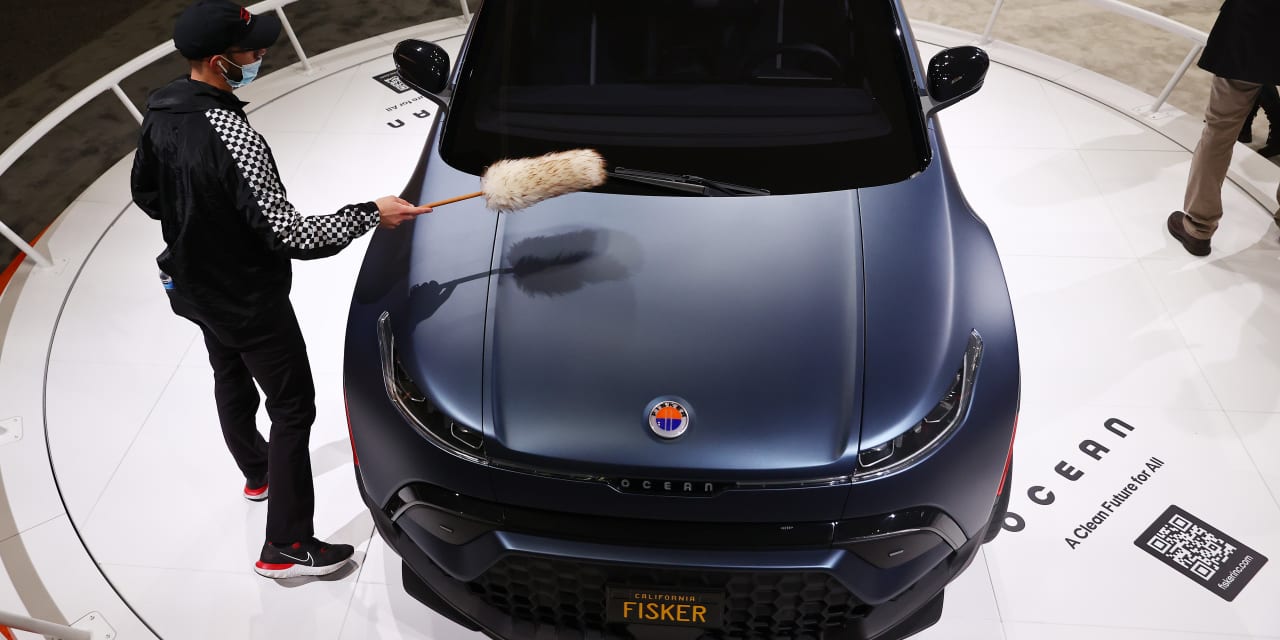Fisker
stock is dropping after catching another downgrade from Wall Street. Fisker isn’t alone though. Analysts are abandoning shares of electric-vehicle start-ups that don’t produce profits or free cash flow.
Monday, Evercore ISI analyst Chris McNally downgraded Fisker stock to the equivalent of Hold from Buy. His price target was cut to $2 from $6 a share.
“We know when it’s time (way overdue) to throw in the towel,” wrote McNally. The company’s recent production guidance cut to 10,000 units for 2023, down from guidance of 13,000 to 17,000 provided only three weeks ago was one of the reasons cited.
It isn’t the first downgrade for Fisker shares in recent weeks. The stock has been downgraded four times, according to FactSet, in the aftermath of guidance cuts, the departure of two chief accounting officers, and the disclosure of material weaknesses in the company’s accounting controls.
Now, about 23% of analysts covering Fisker rate the stock at Buy and 38% have Sell ratings. In October, about 42% of analysts covering the stock had Buy ratings, and 25% were at Sell. The average Buy-rating ratio for stocks in the
S&P 500
is about 55%.
The average analyst price target on Fisker stock is now $4.55, according to FactSet, down from about $8 in October.
Fisker stock was down almost 5% in early trading Monday at $1.64 a share. The S&P 500 and
Nasdaq Composite
were down 0.7% and 1.1%, respectively.
Along with the downgrade, R.F. Lafferty analyst Jaime Perez cut his price target to $3 from $7. He kept his Buy rating, though. He still projects positive $103 million in earnings before interest, taxes, depreciation, and amortization, or Ebitda, for 2024. Conversely, the Wall Street consensus compiled by FactSet is for an Ebitda loss of about $140 million.
The slide in Wall Street sentiment toward Fisker is mirrored in shares of other EV start-ups that have yet to achieve profitability.
Only one analyst out of 15 covering
Lucid Group
stock has a Buy rating. In October, five had Buy ratings; a year ago, four out of 10 analysts did.
For
Polestar Automotive,
33% of analysts covering the company rate shares at Buy today. In October, 56% had Buy ratings. A year ago only three analysts covered the stock. Polestar has picked up new coverage over the year, and now nine analyst cover shares.
Chinese EV stocks have seen similar trends.
NIO
and
XPeng
have seen Buy-rating ratios fall over the past 12 months.
Li Auto
has been an exception with roughly 90% of analysts still rating share Buy. Li Auto, however, is shipping some 40,000 EVs each month and is now profitable.
Rivian Automotive
is the one exception among money-losing EV start-ups. About 68% of analysts rate shares at Buy, about the same as October; a year ago, 62% rated shares Buy.
Still, Rivian stock, through early trading on Monday, was down about 43% over the past 12 months.
The message in all this for investors is fairly simple. Amid rising interest rates and a slowing economy, profits matter. Higher rates make financing start-ups more expensive, far harder than when rates were around zero percent and many EV start-ups were raising capital.
Fisker, Rivian, Lucid, Polestar, NIO, and
XPeng
have used about $41 billion combined over their histories. It doesn’t appear that amount of money will be available to anyone without profits just around the corner.
The combined market capitalization of those six EV start-ups is still about $57 billion. Rivian, XPeng, and NIO together account for about 75% of that amount.
Write to Al Root at allen.root@dowjones.com
Read the full article here













Leave a Reply